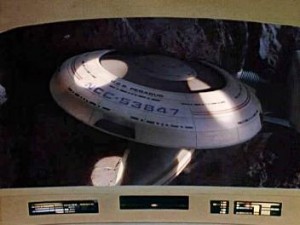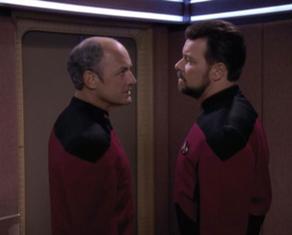This is the first entry in my “Top Ten Star Trek: The Next Generation” episodes.
“The Pegasus” was one of the episodes I saw when it was first on. It was one that I remember pretty well, which I think may be one reason this is on my top ten list.
The general synopsis is that Commander Riker’s first commanding officer, Admiral Pressman (played by Terry O’Quinn from Lost), comes aboard the ship to retrieve wreckage from Riker’s first ship that was destroyed in action. We eventually discover that the ship was not in fact destroyed. The ship had an experimental cloaking device on board that was in violation of a Federation treaty (explaining why the Enterprise and the Federation does not have cloaking technology). The crew died while attempting a mutiny. Riker, who was on his first assignment, sided with the Captain and followed orders. This decision has haunted him throughout his career and is partially responsible for the man he is today.
“The Pegasus” taps into themes that will probably be beaten to death over the course of these posts: Authority and moral ambiguity.
I have a fascination with how people respond to authority. The Milgram Experiment demonstrated that people will do unspeakable things when directed to do so by an authority figure. I have a book on my bookshelf called “Ordinary Men” talking about people who were in the SS in Nazi Germany.
Riker was put into a situation where he was being asked to do something that went against his conscience. It didn’t occur to him at the time to disobey that order, but over the years it ate at him. Had he disobeyed the order he would have died along with everyone else. Because he did something morally repugnant he was in a position to bring it to light later. Had he not been there it is likely no one would have known what happened.
The episode also asks the question of whether we should act in good faith when the people we have made a truce with have no such intentions. This episode was from pre-Deep Space Nine where moral ambiguity was most fully explored in the “real” Star Trek (not that horrible JJ Abrams crap). Finding out that the Federation was breaking a treaty and trying to cover it up was some pretty heavy stuff for TNG.
I have gotten myself in trouble over the years by thumbing my nose at authority. When I was in college I worked for the school newspaper. My editor sent me out on a story that wasn’t real. I told her it wasn’t real and she told me to just make something up to take up the space she had allocated for it in the paper. I told her I would not because I found it to be unethical and I received a scathing email from her raking me over the coals for letting down the paper and for my unprofessional behavior. The newspaper teacher got involved and took her side because he wanted her to learn to trust her instincts. This is one of many reasons I didn’t go into journalism.
I have an almost pathological aversion to doing something I find to be morally wrong, even when I know I can tell myself that my view of the situation is overly extreme and it isn’t a matter of life and death. I know my family would have been far happier had I learned to swallow my pride and just do what I was told.
I know a lot of people claim to value honesty and integrity, but they really don’t. There is a lot of willful ignorance out there in the world and people do not like it when you break the illusion of their chosen reality. Me, I want to know what is going on, even if it is painful. I want to be able to work effectively with the way things are and not how I want them to be.
If I had just made up a story, it isn’t like I would have been kicked out of school. I don’t think it would have earned me any brownie points with the editor and I don’t think it would have influenced my decision to walk away from journalism. I felt good because I stuck to what I thought was right, but I had to drop the class and it caused trouble for me later when I had to find something else to take in order to graduate.
This episode interests me because I know if I had been Riker I would have gone along with the mutiny. But then I would be dead. Twenty years later the tech would have been covered up and no one would have known the truth. It is difficult for me to acknowledge the fact that sometimes you have to go along with things you know are wrong because it is the best choice at the moment. You remember and you wait for the time when your actions can be effective rather than throwing your life away over a useless gesture.
I know that this wasn’t the intended moral of the story, but I did appreciate that this episode asked a hard question without making it a heavy-handed, cut and dry morally unambiguous story. Plus, in the cold open they had “Captain Picard Day” complete with Riker making the Picard doll intone: “Make it so”. Who could ask for anything more??

